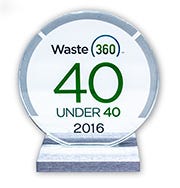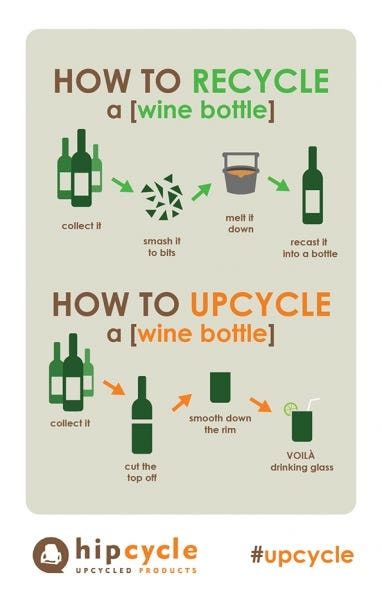Renee Hansen's Passion for Sustainability Led her to a Career in Recycling
Waste360 recently sat down with the 40 Under 40 recipient to discuss her goals for both companies and the future of the recycling industry.
 Renee Hansen, cofounder of SpinFish Events Solutions and owner of Hipcycle, utilizes her passion for sustainability to divert trash generated by events from landfill through the processes of recycling, reusing and upcycling.
Renee Hansen, cofounder of SpinFish Events Solutions and owner of Hipcycle, utilizes her passion for sustainability to divert trash generated by events from landfill through the processes of recycling, reusing and upcycling.
Hansen has a background in finance, but her interest in sustainability led her to make a career change in 2013. For the past three years, she has worked with both SpinFish and Hipcycle to lead a change in waste reduction and to start a conversation about the importance of recycling, reuse and upcycling.
"Renee’s most admirable quality is absolutely her unwavering commitment to making the world a better place," says SpinFish cofounder and Hansen's sister-in-law Stephanie Hansen. "In her personal life, she walks the walk. From her two large composting bins in her backyard to acquiring almost all of her produce from local farms to reducing her family's waste to less than one trash bag a week and finding creative ways to repurpose almost any material, Renee never ceases to amaze me for her abilities in this area."
Waste360 recently sat down with the 40 Under 40 recipient to discuss how her waste and recycling career began, her goals for both companies and the future of the recycling industry.
 Waste360: How did you get your start in the waste and recycling industry?
Waste360: How did you get your start in the waste and recycling industry?
Renee Hansen: It was a natural life progression. I moved out to San Francisco, which is a hub for the green movement, and started to learn more about sustainability from people I hung out with. As I gained more interest in the topic, I started doing more sustainable work instead of just talking about it.
In 2013, I partnered with my sister-in-law Stephanie to create SpinFish, a waste diversion and rescue service specializing in diverting event leftovers from landfill. Stephanie was in the events industry at the time, and I was helping her out at events. I was appalled by the amount of waste thrown out at events, and I would take leftover items from the events and donate them. Stephanie and I eventually discussed picking up leftover items from events on a larger scale and drew up a business plan. From there, we began a discussion with people Stephanie had worked with in the past, and our idea took off as a viable business model for trade shows, events, movie premieres, video game launches and more.
Hipcycle was actually a business partner of SpinFish before the founder asked me to take over the reins. Hipcycle would receive some of the raw materials from the events SpinFish worked, and then it would partner with product developers to turn these materials into upcycled goods. Now, I work to bring the world of upcycling to a larger audience by showing others how important it is to reduce, reuse and recycle.
Waste360: Provide a few examples of how SpinFish helps divert materials from landfill at events.
Renee Hansen: At trade shows and events, the SpinFish team goes around to every exhibitor in the middle of the show to let them know who we are and where to take their materials if they are leaving them behind. We have created an entire network of recipients that can take the materials for future use. These recipients have scheduled times to come and pick up the materials that they need. This process is done at the end of a trade show or event in a designated area.
At events and trade shows, we typically find future use for swag, giveaways for attendees, display items, TVs, treadmills, vinyl, foam, perishable goods, plant, furniture, etc.
At the last SXSW, we did about 50 pickups in a matter of a day. It's a little bit of a symphony really. We set up the designated area like a pop-up shop, and recipients walk through and pick materials that suit their organization's needs.
We recently collaborated on a project for Target’s Marimekko design launch at the High Line in New York. Target had a lot of large outdoor inflatables that they needed to get rid of, and we helped find homes for those items. We have also worked on projects for the Gap and a few movie premieres.
Right now, we are currently working on a large project for Honda, and we expect more than 30,000 lbs. to be diverted from that project.
Waste360: What are your current goals for both SpinFish and Hipcycle?
Renee Hansen: I want to continue to build awareness with both brands. The beauty of these two brands is that SpinFish really focuses on large companies, trade shows and brands, while Hipcycle focuses on the masses and the everyday person. With both of these approaches, we can continue to reduce the waste that's being created.
With SpinFish, I want to make sure that we continue to reach out to organizations and big brands to help them change some of their ways. Yes, it costs money to have a company like SpinFish come in and help them come up with a plan to divert materials from landfill, but it pays off in the end. I also want the company to continue to build a client base and build knowledge resources for those clients.
At the end of all of our projects, we provide our clientele with sustainability reports, which reveal how many pounds were diverted from landfill, the type of materials that were diverted, who the materials reached and the softer stories people can understand. For example, we may reference that a client's materials went to a school for art supplies.
With Hipcycle, we are continuing to get the word out to more mainstream folks. We were recently published in some textbooks to reach a younger audience, and we want to continue to build the press that goes out. We have also just added some of our upcycled products into amusement parks, which is a fun thing for us.
We would also like to build data-driven information for Hipcycle, which would be similar to the sustainability reports we do at SpinFish. This information would be for the everyday consumer and would include information like "our products saved X amount of pounds from going to landfill," for example.
Waste360: How can industry leaders improve waste management at their events?
Renee Hansen: I think it’s really important to be creative and to think outside the box. You need to think about whom else could truly use these items because you don’t want to just dump the items on other people just to get them off your hands. You want to give the items to others who will make use out of the materials so the items don’t end up thrown in the trash like they initially would have after an event.
Waste360: What's in store for the future of recycling?
Renee Hansen: I really think upcycling is going to become more of a way of the future, and it's going to continue to be a cool way for people to reduce waste and create unique items. Everyone wants something a little different, something with a story and something that sets them apart from the crowd. There's truly something special about owning something that there isn't hundreds of.

About the Author
You May Also Like




.png?width=300&auto=webp&quality=80&disable=upscale)